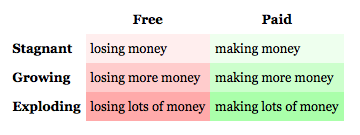Michael Lewis, who says he sympathizes with the Occupy Wall Street movement, interviews himself on what he would do if he were its leader:
But if I were in charge I would probably reorganize the movement around a single, achievable goal: a financial boycott of the six “ too big to fail ” Wall Street firms: Bank of America, Citigroup, JPMorgan Chase, Goldman Sachs, Morgan Stanley, Wells Fargo. We would encourage people who had deposits in these firms to withdraw them, and put them in smaller, not “too big to fail” banks. We would stigmatize anyone who invested, in any way, in any of these banks. I’d try to organize college students to protest on campuses. Their first goal would be to force the university endowments to divest themselves of shares in these banks.
Do you really think that could work?
Yes. I think we could create a run on a bank.
Radical talk from one of the most influential business writers around.
— The Atlantic‘s Alexis Madrigal writes about how the tech revolution has gone all small ball:
But more than the bandwidth or the stagnant hardware, I think the blame should fall squarely on the shoulders of the business model. The dominant idea has been to gather users and get them to pour their friends, photos, writing, information, clicks, and locations into your app. Then you sell them stuff (Amazon.com, One King’s Lane) or you take that data and sell it in one way or another to someone who will sell them stuff (everyone). I return to Jeff Hammerbacher’s awesome line about developers these days: “The best minds of my generation are thinking about how to make people click ads”…
The thing about the advertising model is that it gets people thinking small, lean. Get four college kids in a room, fuel them with pizza, and see what thing they can crank out that their friends might like. Yay! Great! But you know what? They keep tossing out products that look pretty much like what you’d get if you took a homogenous group of young guys in any other endeavor: Cheap, fun, and about as worldchanging as creating a new variation on beer pong.
— Madrigal points us to the Pinboard blog, which put up this chart in a post on why free websites don’t cut it:
Someone builds a cool, free product, it gets popular, and that popularity attracts a buyer. The new owner shuts the product down and the founders issue a glowing press release about how excited they are about synergies going forward. They are never heard from again.
Whether or not this is done in good faith, in practice this kind of ‘exit event’ is a pump-and-dump scheme. The very popularity that attracts a buyer also makes the project financially unsustainable. The owners cash out, the acquirer gets some good engineers, and the users get screwed.
To avoid this problem, avoid mom-and-pop projects that don’t take your money! You might call this the anti-free-software movement.
Hi, Google. I would have paid you something for Picnik. Too bad.
I think there are some lessons here for news outlets.
Ryan Chittum is a former Wall Street Journal reporter, and deputy editor of The Audit, CJR’s business section. If you see notable business journalism, give him a heads-up at rc2538@columbia.edu. Follow him on Twitter at @ryanchittum.

